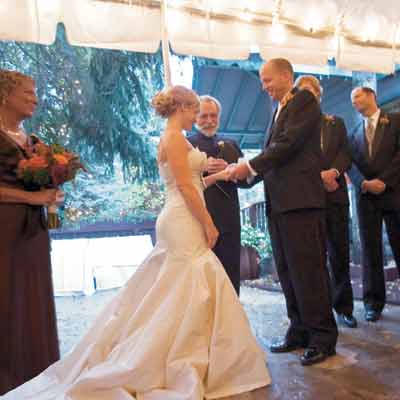"Gathered here together," the dearly beloveds of the bride and groom are more than just an audience. They are witnesses and can make vows of their own.

This writing was originally presented during the wedding ceremony of our good friends Melissa Bond and Chase Fetter last fall. For this traditional month of weddings, we offer it to you-a reminder to all of us who have taken (or who contemplate taking) this step.
We all hear a lot about how we fail each other. Great literature tells us about it, and country music songs. We know heartbreak and all its good reasons.
But we can also love.
We can. Do it.
We can love.
Love, when it lasts, becomes a habit. Habit is usually a bad word. But it is also part of inhabit, and that’s what lovers do, they inhabit each other, they house each other. The container of where you were before changes to a place where your beloved is also. Where does your self end and the beloved’s begin? Where does your body end and the other’s begin?Sometimes you don’t know. (You really don’t know.)
I read in the paper recently that scientists have proven, using trick cameras and willing volunteers, that human consciousness is capable of out-of-body experiences. To which mystics will say "we knew that."To which the married say "we knew that. We are out of our selves in love."
But consciousness melding-profound though it is-is merely the party trick of marriage. The real feat of love is the same as always: In this moment, do you act toward this person with more kindness than less, more generosity, more forgiveness, more tenderness, more … pleasure, delight, welcome…? Do you do the bittersweet waltz of everyday life together? When small acts of love become a habit, year after year, love grows. Love expands into parts of yourself you don’t know yet that you have.
As my father said on the occasion of my sister’s wedding, you think you love each other now? You have no idea.
Today, you are going to vow to love each other forever. Vowing in public before your friends and family is a solemn and holy act. And to help you do it, we will go first. We’ll make some vows to you:
We promise to love, honor and protect this couple through all the days of their lives together.
We promise to whisper sweet nothings into their ears, (you’re a great couple… I love how you are, together… the two of you are gorgeous)… so they feel the current of love and remember it’s there.
We promise to make them laugh in times of trouble and help them to turn to each other in times of sorrow.
We vow to support them in keeping their marriage alive and full of spirit.
As they embark on this ancient tradition of mating for life, we, the community, the congregation…we hold them in our protection and that of all those who have come before us.
This verse was transcribed from hieroglyphics on a 3,500-year-old Egyptian vase:
This love is as good
as oil and honey to the throat,
as linen to the body,
as fine garments to the gods,
as incense to worshippers
when they enter in,
as the little seal-ring
to my finger.
It is like a ripe pear
in a man’s hand,
it is like the date
we mix with wine,
it is like the seeds
the baker adds to bread.
We will be together
even when old age comes.
And the days in between
will be food set before us,
dates and honey, bread and wine.
Amen.
Dorothee Kocks is managing editor and fiction editor of the Wasatch Journal. Author of the non-fiction book "Dream a Little," she’s currently writing a novel about a woman, a man, and a strange musical instrument. Called "The Glass Harmonica, or The Sensualist’s Tale," it’s a historical novel about how love and pleasure can change the world.
